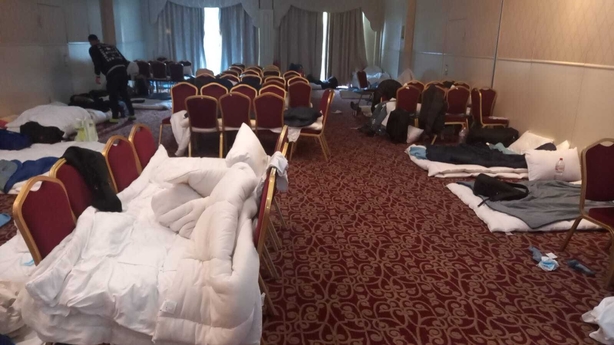Minister for Children, Equality and Integration Roderic O'Gorman has said the situation in relation to asylum seekers sleeping on the floor at the Red Cow Moran Hotel in Dublin "is not acceptable".
It emerged last weekend that large numbers of people were sleeping on the floor of the hotel, with photographs posted on social media showing dozens of makeshift beds in the hotel’s conference rooms.
The responsibility for allocating accommodation for asylum seekers rests with Mr O'Gorman’s department, which yesterday confirmed it was aware of the situation.
Speaking on RTÉ’s Today with Claire Byrne, Mr O'Gorman said: "It's not the sort of response as a country we want to be providing to people fleeing here."

He added: "In the short term, myself and my officials will be engaging with the Irish Refugee Council, with the Jesuit Refugee Service who flagged up their concerns, to see what measures we can take in the short term to improve the situation there."
Mr O'Gorman said there have been days where the number of people seeking international protection has put a lot of pressure on the system.
"There have been days where we haven't been able to provide accommodation immediately, and that's when we've had to rely on the centre in the Red Cow.
"We are taking measures to address it, and in the medium term earlier this year we undertook a procurement process to get more accommodation for people seeking international protection that's completed, and we'll be commissioning and opening those additional units of accommodation in the weeks to come."

The minister acknowledged that there are two different systems in place, dealing with people from Ukraine and people coming from elsewhere. That is a decision made by the EU and not the Government, he explained.
"6,500 people were being accommodated last year, 35,000 this year, that has put pressure on the system," he said.
He added: "We're doing our best to address that in the short term, while continuing on that long term goal of ending Direct Provision".
He said the Ukraine crisis has "undoubtedly impacted on the department's immediate response to everyone coming into the country".
However, he said he is still committed to ending Direct Provision, adding that it is set out as the policy of Government, and the Government will work towards that.
Mr O'Gorman also said the accommodation situation remains "undoubtedly tight" for Ukrainian refugees, adding that the Government has extended a significant number of the three-month hotel contracts but warned that a pinch point is coming at the end of July.
He said that as long as Ukrainian families feel unsafe in their own country, there is an onus on all countries across Europe to help.
We need your consent to load this rte-player contentWe use rte-player to manage extra content that can set cookies on your device and collect data about your activity. Please review their details and accept them to load the content.Manage Preferences
The minister said the Government is being upfront with people and saying the accommodation here is not as ideal as it should be, but that people are still arriving because they feel safer here.
Meanwhile, the National Director of the Jesuit Refugee Service of Ireland called for an emergency response to tackle the shortage of suitable accommodation for asylum seekers.
Eugene Quinn welcomed Minister O'Gorman's comments that he is willing to engage with his organisation and the Irish Refugee Council.
But Mr Quinn insisted that there needs to be a whole of Government approach and a more strategic approach in order to establish a long term solution.
Speaking on RTÉ's News at One, Mr Quinn said: "It takes your breath away to see. It's like a humanitarian disaster to see people lying on the floor and in those situations."
He said that in his 16 years working in this area, these are the "worst conditions" he has seen and described them as"extraordinary and unacceptable".
In some cases there are chairs pulled together with duvets thrown over them, he added.

